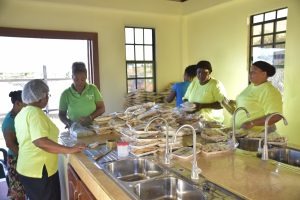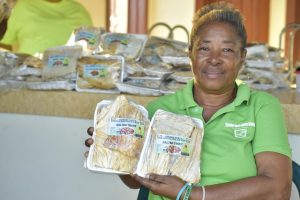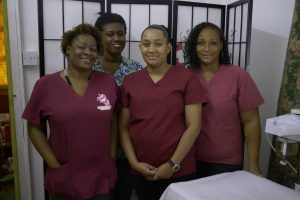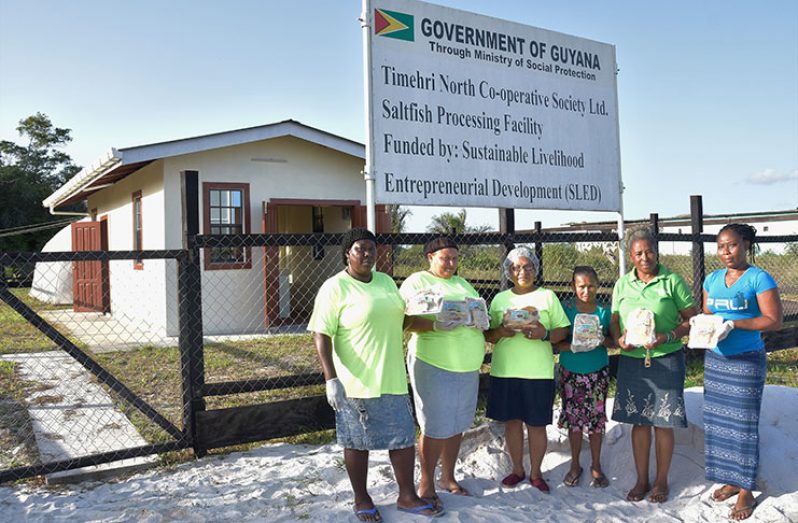– from potential to prosperity
ENTREPRENEURSHIP is critical to create wealth within a society and to enhance standards of living. Entrepreneurs introduce new products and services, create employment, generating more wealth and adding to the national economy. The Government of Guyana has continuously advocated for the development of small businesses and has put in place facilities that provide training to ensure their success.
In this edition of Government in Action, we explore how the government’s support for small business development has created hundreds of jobs and changed many lives, by turning business plans into businesses and the unemployed into entrepreneurs.
Creating a space for start-ups

In 2019, the Ministry of Business through the Small Business Bureau (SBB), and the Ministry of Social Protection, through its Sustainable Livelihoods Entrepreneurial Development (SLED) programme, disbursed over $260 million in grants to new, small business owners. The SBB, on its own, disbursed over $44 million in grants last year, which led to the creation of 195 small businesses and over 300 jobs.
Leading the government’s drive to ensure that start-ups get the support they need, is Minister of Business Mr. Hemraj Rajkumar. Minister Rajkumar said the grants are provided to facilitate small and micro-enterprise development.
“Micro industries have a very important role to play in [Guyana’s] development. For example, we have been hearing about local content and I think that our entrepreneurs, our business persons, as long they are properly accredited… would be able to [provide goods and services for] the FPSO [Floating Production Storage and Offloading] vessel and all [operating within the] oil industry… We work hard and guide our young business persons… I think that if we can have our entrepreneurs understand that we have to do business in a correct manner and satisfy all the requirements of the market… I don’t see why we can’t have active and productive and profitable small businesses in our country,” the minister said.

As the businesses grow, the minister said, their need for financing increases. For further empowerment and security, entrepreneurs who have benefitted from the grant scheme are able to access loans at a reduced rate of interest. The Ministry of Business, working with a local bank, also guarantees up to 70 per cent of collateral for the loan.
In addition, the SBB provides training opportunities in General Business Management. The training programme is tailored for sector-specific needs, focusing on technical skill development, which gives beneficiaries an opportunity to refine their products and enhance their productivity.
“You’re giving a man some resources to start a business and if he doesn’t understand how business works, then we’re heading for trouble,” Minister Rajkumar said.
The Ministry of Business, he said, does not only disburse grants, but continuously guides the beneficiaries in their business development to ensure that their ventures are sustainable and that the business owners maximise on the investment made.
“It’s a relationship between the [Small Business] Bureau and the client… We would go after a few months to ensure that things are working well… It’s not a one-off story, [where] you come, collect your grant and leave. [Rather,] we have constant communication, constant meetings. So even though the grant is given, sometimes they would like to have some more training,” he said.
Moving from potential to prosperity
Aesthetician, Ms. Samantha Henry, is a beneficiary of both a loan and a grant through the SBB. She is the proprietor of the Rejuvenate Health Spa and Salon, located in Da Silva Street, Kitty. Ms. Henry trained in aesthetics and massage therapy in the United States of America and Saint Vincent. In 2001, she re-migrated to Guyana and has since been practising her trade.
In 2017, she approached the SBB, where she received business training and obtained a grant of $200,000 and a loan of $500,000.
“When I first started, I [was] by pushing a suitcase down the road with a foot spa inside of it and I went from house to house… I really have to thank God for [the] Small Business Bureau, because I used to just be walking around the place doing manicures and pedicures… Finally, I decided to settle in a salon where I rented a room and worked there, but I always wanted to own my own business. I went into [the] Small Business Bureau, they sent me to do a course on business management and six months after I did that course, I had my own business… The first thing they did for me is… educate me on how to get it done and that was the most important thing of it all,” Ms. Henry said.
Since then, Ms. Henry has been able to expand her salon and she has employed three members of staff. She noted however, that an important part of her success is that she views her staff as team members. “I realise that I cannot do it alone and each one of them brings a different skill… They are adding value to my business,” she said.
Ms. Javita Kerr, a massage therapist at the Spa, said she obtained employment in November after completing training some time during the year. Ms. Kerr heaped praise on Ms. Henry’s leadership as an employer and explained that she has since added to her skillset.
“It’s a great feeling!. She is sharing her knowledge; I’m also learning to do facials, manicures, pedicures… It’s great to know that another woman can empower you to fulfil your dreams,” Ms. Kerr said.
Another SBB beneficiary, Ms. Dionne Roberts, proprietress of Dionne’s Beauty Salon, said she received a grant sum of $449,000, which enabled her to purchase critical appliances for her business.
During our interview at her Stelling View Arcade, Stabroek Market location, Ms. Roberts said a friend told her about the funding facility at the SBB, so she made enquiries.
“I went in and asked for a loan, but they offered me a grant, so I signed up and it was approved in January of last year… I took the cheque to Clippers where I got my quotations and I collected two chairs, products to work with, a foot spa, and everything. It improved the business a lot because customers now come and sit to get their hair done and they’re comfortable. I would like to thank the government for blessing me with the cheque and giving me the strength to uplift my business,” Ms. Roberts said.
Sustainable Livelihoods and Entrepreneurial Development (SLED)

The Sustainable Livelihoods and Entrepreneurial Development (SLED) programme is another scheme administered by the Government of Guyana, through the Ministry of Social Protection, to facilitate the creation of small businesses and stimulate the growth of micro-enterprises. In 2019, the ministry invested a total of $227,000,000 in 28 cooperative groups in order to fund 65 projects spread across Pomeroon-Supenaam (Region Two), Essequibo Islands-West Demerara (Region Three), Demerara-Mahaica (Region Four), Mahaica-Berbice (Region Five), East Berbice-Corentyne (Region Six), Potaro-Siparuni (Region Eight), Upper Takutu-Upper Essequibo (Region Nine), and Upper Demerara-Upper Berbice (Region 10). Today, 37 of those projects are complete and, according to the ministry, will benefit over 3,200 persons.
The businesses are primarily based on cash-crop farming, livestock rearing, agro-processing, catering, craft production, and beauty.
One of the successful economic ventures established in 2019 under SLED, is a salted-fish processing facility located at Timehri North, East Bank Demerara. The facility, which was funded by the government at a cost of $5 million, is managed by the Timehri North Cooperative Society, which comprises mostly women. It became operational in September 2019 and employs 10 women from the community.
The co-operative is chaired by Ms.Carmen Simon, who said that by creating a business in her community, her cooperative is reducing unemployment. As the business grows, she said, she expects that even more persons will gain employment.

“We decided to start the [co-operative] because of the unemployment of women in the community and we wanted to find something to assist them that would be beneficial to them,” Ms. Simon said.
The business started selling 50 pounds of salted fish per week. That amount has steadily increased, though it did experience a drop in sales in December as other meats are preferred during the festive season.
Since the start of the New Year, however, she said business is picking up again.
“I’ve seen tremendous growth in the business and I think that we can grow from strength to strength and establish ourselves by exporting our stuff. I would like to encourage women in the country who are not doing anything or are unemployed, to come together as a group and set up a proposal. There is help out there. Apply to the Ministry of Social Protection or the Small Business Bureau,” Ms. Simon said.
The Government of Guyana is cognisant of the benefits of having a vibrant and sustainable small business and microenterprise sector as it contributes significantly to the Gross Domestic Product (GDP). Entrepreneurship spurs economic growth by creating new businesses that generate wealth and myriad other multiplier effects in a society. As a result, the government continues to provide the support necessary to nurture the growth of small businesses, through regulation and training, micro-credit financing and other technical assistance.



.jpg)









